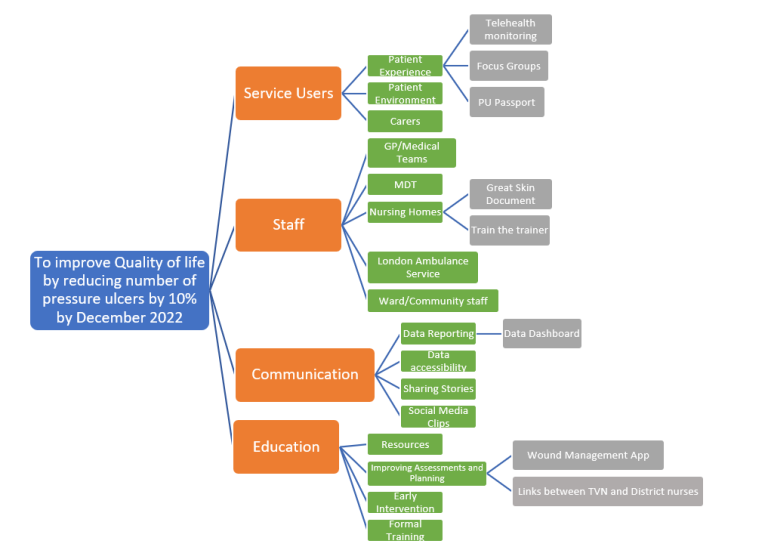
QI Coach Story: “Don’t be scared, give QI a go!”
20th January 2023
Written by Thamina Kahar (Life Skills Recovery Worker) and Clarissa Sorlie (Improvement Advisor)
Quality Improvement (QI) is everyone’s business. Here at ELFT, our aim is for everyone – especially those closest to the work – to be part of improving their service for the benefit of both patients and staff.
Thamina Kahar, a Life Skills Recovery Worker at Newham Centre for Mental Health, tells us about her journey to become a QI Coach.
Tell us a bit about yourself.
My name is Thamina Kahar, I am a Life Skills Recovery Worker on Ruby Triage Ward at Newham Centre for Mental Health. My role is to support the nurses and healthcare assistants with their jobs, and to facilitate activities and events on the ward.
I started taking part in QI in when I did the Improvement Leaders Programme. This five-month programme helps project teams know how to make improvement a reality. Now I’m doing the 6 month Improvement Coaching Programme, and coaching a QI project. This programme helps people to develop a deeper knowledge of quality improvement and the skills to coach QI teams.
How did you come to be involved with QI?
When I was working as a social therapist in forensic services, my manager put my name down for the Improvement Leaders Programme. I was confused because I was “only a band 3”, so I didn’t know if the training would be right for me. My manager encouraged me and said that he saw potential in me, so I gave it a go.
I enjoyed the training and learnt a lot. The most useful thing I learnt was about Plan, Do, Study, Act Cycles (PDSA). You can use this on a day-to-day basis: make a goal, think about how you’re going to do it, do it, then study your results. I use PDSA to do my job role, and even use it in my personal life. I run my own business and I use PDSA cycles to test out new ideas for my business and work towards success. Driver Diagrams are useful as well as they help show the areas you think you need to work on to work towards your aim.
How have you used QI in your work so far?
My experience of QI has been great. When I worked in the Forensics directorate, service users weren’t satisfied with the quality or frequency of their 1:1s, so I led a project called ‘Let’s Talk’. It was all about improving the quality and frequency of engagement between staff and service users. We had two service users on our project team, and we came up with lots of change ideas to improve 1:1s.
One of the changes we tested was a ‘Let’s Talk’ window. Staff and service users worked together to identify times on the ward that were less pressured, so that requests would be more likely to be facilitated. It’s important to note that staff still supported service users outside these times if the request was more pressing. We also introduced a ‘Talk of the Week’ box, where service users would pick a prompt card out of the box, and it would become the topic of the week for everyone to talk about.
Leading this project made me feel proud of myself. It was a great achievement as I was able make constructive changes which had a positive impact for service users and staff. We improved service user satisfaction with the quality of their 1:1s from 65% to 93%, and staff told us that they felt more confident in facilitating 1:1s as a result of the project.
Before I did a QI project, I wasn’t confident to speak up. Building my skills through QI gave me confidence and taught me how to lead a team. I presented my work at a QI conference, the Royal College of Psychiatrists, and to the CEO of ELFT at the time, Dr Navina Evans. Now I feel confident to speak up and have a voice of my own. QI has given me opportunities to draw on my creative side and think outside of the box. The success I had with the project encouraged me to become a QI coach and support another team with their project and keep developing my skills further. I have become very passionate about QI, and it motivates me to create even more improvement in my service.
What would you say to someone like you who may be curious but may also feel daunted about joining a QI project?
If you are thinking about improving something in your service, I would encourage you to step up and do it. Don’t be scared, give it a go! I went from not knowing what QI was, to leading a whole QI project, even though I was in a junior position. It was a success! Now I’m coaching a team to develop their skills. So, what’s going to stop you?
Most Read Stories
-
Why is Quality Control important?
18th July 2018

-
2016 QI Conference Poster Presentations
22nd March 2016
-
Recognising Racism: Using QI to Help Take Action
21st January 2021

-
QI Essentials: What does a Chief Quality Officer do?
18th March 2019

-
Using data enabled us to understand our problem
31st March 2023

-
The Power of Data in Reducing Pressure Ulcers
12th January 2022


Follow QI on social media
To keep up to date on the latest concerning QI at ELFT, follow us on our socials.



